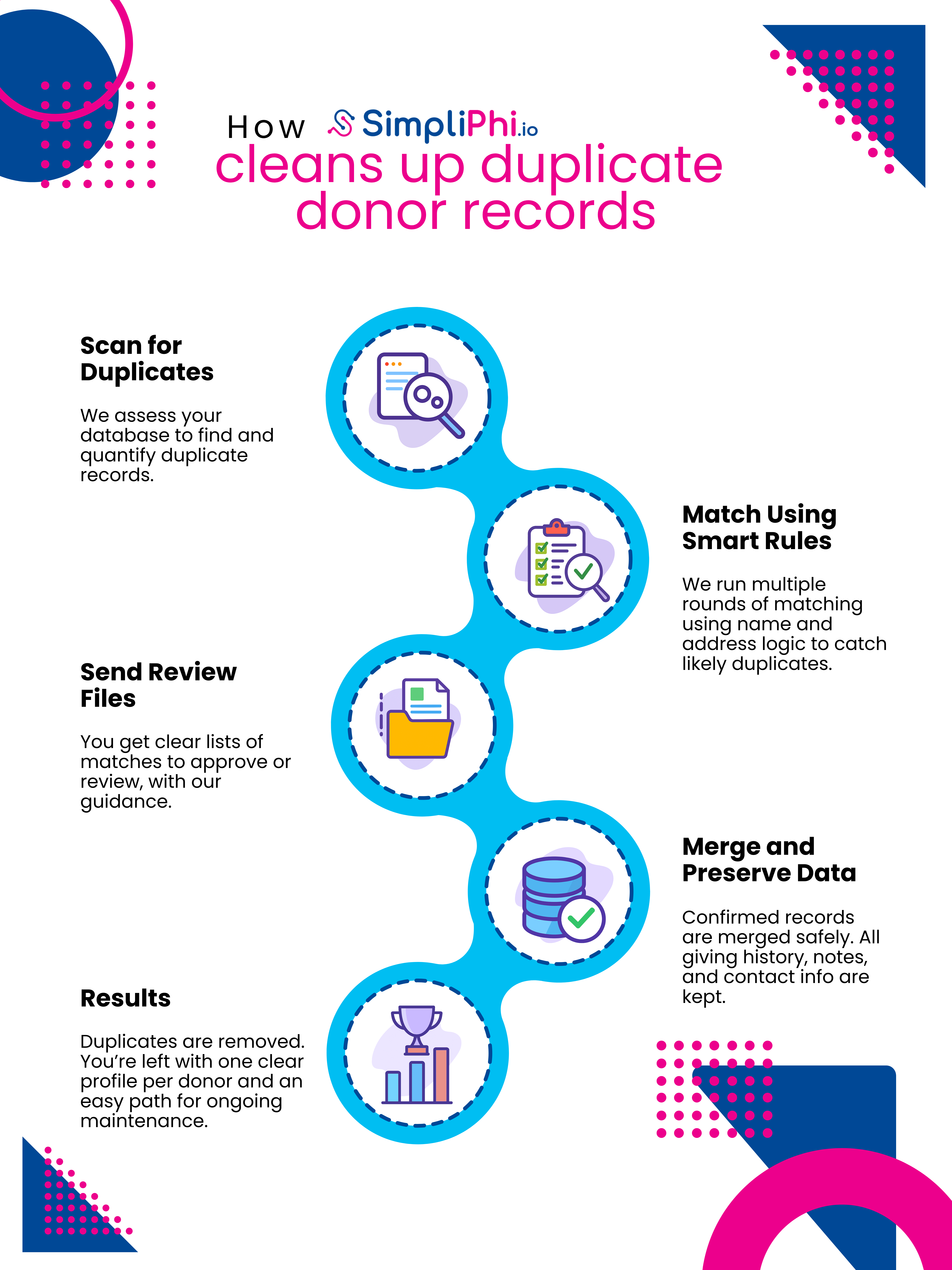Imagine sending the same appeal to a donor multiple times, needlessly inflating printing, postage, and email costs without any added benefit. This is where a robust Deduplication Service comes in. In this article, we'll explore the value of deduplication, how it works, and why it’s a game-changer for fundraising teams and marketing campaigns.
%20(10).png)
At the heart of every charitable organization is the relationship it nurtures with its constituents. Clean, accurate data is crucial to building and maintaining that trust. Through our work on CRM migrations and Data Health Services, we've observed a common issue that hampers these efforts: duplicates.
🧩 Fragmented Donor Profiles
When information is split between duplicate records, you never see the full picture. For example, if a major donor’s gifts are spread across two profiles, your team might not realize their total giving and treat them like a new or lapsed donor by mistake. Such mishaps can damage donor relationships and lead to missed opportunities.
📉 Inaccurate Reporting and Analytics
You can’t reliably segment or personalize communications if some donors appear twice. As a result, "organizations cannot send the right message to the right person at the right time, when their databases are cluttered with duplicate records," explains Christina Giffen, Project Coordinator at SimpliPhi. Good decisions rely on good data, and that requires de-duplicated data.
⚖️ Compliance Risks
Data privacy regulations (like GDPR and various anti-spam laws) require accurate record-keeping and honour opt-out requests. Duplicate records can lead to mistakes, such as emailing someone who has unsubscribed (because the opt-out was marked on one record but not the other).
💸 Unnecessary Database Costs
Many CRM vendors charge license fees based on the number of records in your database. By letting duplicates accumulate, nonprofits may inadvertently push themselves into higher pricing tiers.
Each of these issues underscores a simple truth: data quality directly impacts fundraising efficiency and donor satisfaction. That’s why eliminating duplicates is a core component of healthy data management.

We aim to bring the number of system-identified duplicates down to zero.
By combining smart technology with human oversight, SimpliPhi’s approach ensures that every duplicate is identified and resolved with confidence. The result is a cleaner, more reliable donor database, achieved in weeks instead of years of manual effort.
"Going forward, you might just have a handful of duplicates to merge each week or month, instead of letting them pile up.” - Christina Giffen, Project Coordinator at SimpliPhi.
SimpliPhi offers two essential Data Health Services to help nonprofits maintain clean, campaign-ready data. The first, our Deduplication Service, was just described.
The second is our NCOA Service (National Change of Address), which keeps donor addresses up to date by checking the official change-of-address database. It reduces returned mail, lowers mailing costs, helps you qualify for preferred postage rates, and updates everything directly in Raiser’s Edge NXT. We also standardize formatting and flag undeliverable records to improve address accuracy.
By tackling data quality on both of these fronts, deduplication and address updates, your organization can greatly improve operational efficiency and donor relationships. Combining these services amplifies the results. You save on mailing costs, consolidate records, and ensure your communications reach the right people at the right time. This is all part of SimpliPhi’s holistic approach to data health: accurate, consolidated, and compliant data that powers better fundraising.
Talk to our team about running NCOA and Duplicate Management before your next campaign. We’ll help you save money, reduce waste, and connect with more of the right people.